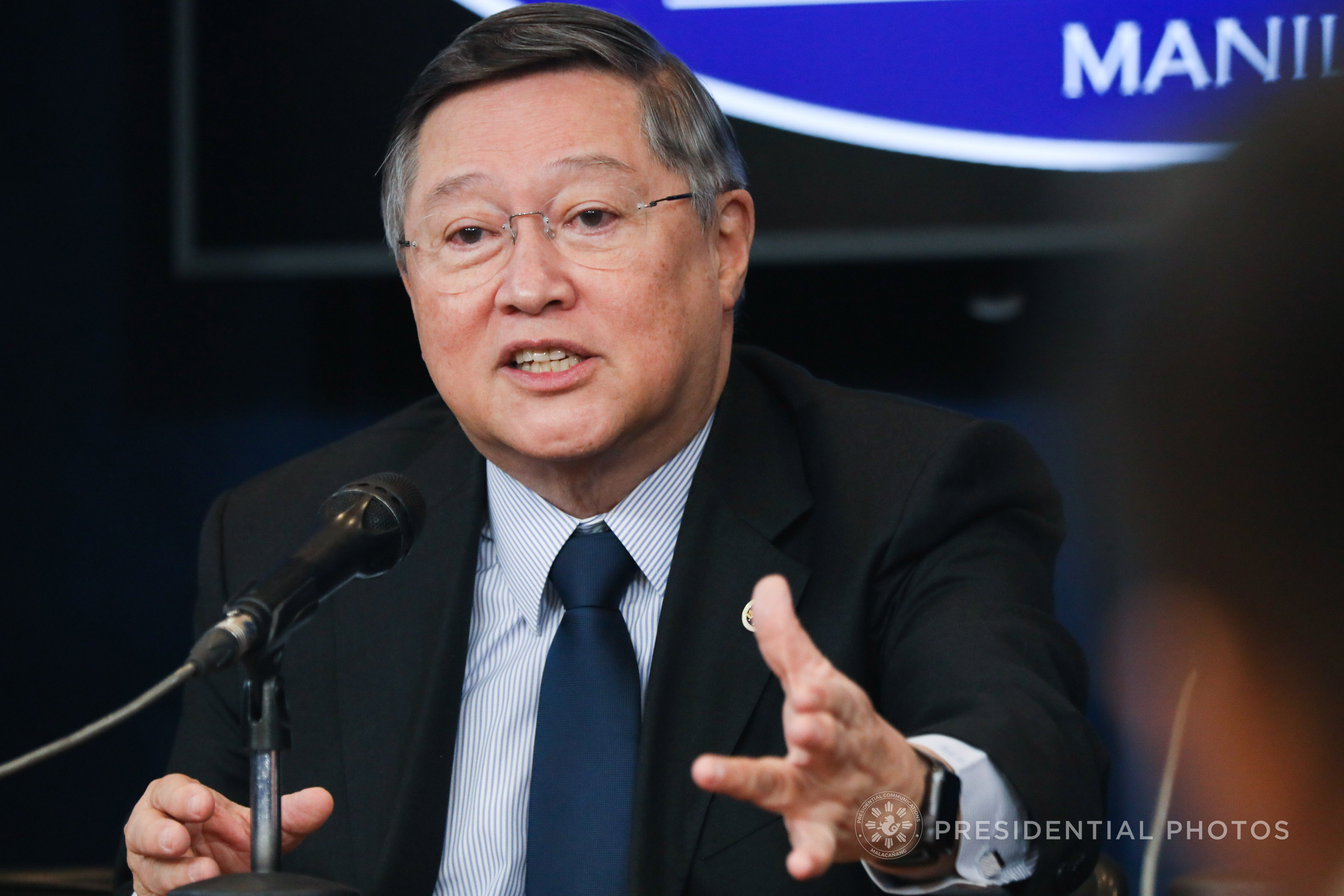
Finance Secretary Carlos Dominguez III Malacañang file photo / TOTO LOZANO
The head of the government’s economic team on Thursday warned that suspending the implementation of the first tax reform package would leave a dearth of funds for free tuition and higher salaries of uniformed personnel.
Citing preliminary Bureau of the Treasury data, Finance Secretary Carlos G. Dominguez last Wednesday highlighted the increased government spending as well as higher tax collections of the country’s two biggest revenue agencies in April partly due to the Tax Reform for Acceleration and Inclusion (TRAIN) Act.
According to Dominguez, expenditures on public goods and services jumped 40 percent to P225.8 billion from P160.5 billion in the same month last year, citing a report from National Treasurer Rosalia V. de Leon.
Last month, the tax take of the Bureau of Internal Revenue rose 13 percent to P209.8 billion from P184.9 billion a year ago, while the Bureau of Customs’ collections of import duties and other taxes climbed 43 percent to P46.9 billion from last year’s P32.8 billion.
During the first week of May, disbursements grew 56 percent year-on-year, while the collections of the BIR and the BOC increased by 342 percent and 43 percent, respectively.
As such, government spending rose 34 percent as of May 7, while tax collections of the BIR and the BOC grew 20 percent and 29 percent, respectively.
However, “suspension of the tax reform program will certainly tend to slow down the ‘Build, Build, Build’ program,” Dominguez told finance reporters in a separate text message, referring to the government’s ambitious infrastructure program.
Under “Build, Build, Build,” the government would rollout 75 “game-changing” projects, with about half targeted to be finished within President Rodrigo Duterte’s term, alongside spending a total of over P8 trillion on hard and modern infrastructure until 2022 in a bid to usher in the “golden age of infrastructure.
Also, suspending the Tax Reform for Acceleration and Inclusion (TRAIN) Act would “possibly negatively affect the government’s ability to fund the free tuition program as well as increase in salaries of the police and the military,” Dominguez added.
President Duterte in March signed the free tuition law in state universities and colleges, while he also approving higher salaries for uniformed personnel in January.
Dominguez was reacting to calls by some legislators to suspend a number of provisions of the TRAIN Law amid higher inflation.
Signed by President Duterte in December, Republic Act No. 10963 or the TRAIN Law since Jan. 1 this year jacked up or slapped new excise taxes on cigarettes, sugary drinks, oil products and vehicles, among other goods, to compensate for the restructured personal income tax regime that raised the tax-exempt cap to an annual salary of P250,000.
READ: Duterte signs P3.77-T 2018 national budget, tax reform law
The TRAIN Law, coupled with a weaker peso and rising global oil prices, had been blamed for the faster inflation at the start of the year.
Last week, the government reported that inflation rose 4.5 percent year-on-year in April, an over five-year high, mainly on the back of a jump in prices of “sin” products such as cigarettes and alcoholic drinks.
As such, the headline inflation rate averaged 4.1 percent during the first four months, already breaching the government’s target range.
Under the TRAIN Law, the unitary excise tax slapped on cigarettes already rose to P32.50 per pack effective Jan. 1 from P30 a pack last year.
The TRAIN Law mandated a further hike in the cigarette excise tax rates to P35 per pack from July 1, 2018 to Dec. 31, 2019; P37.50 a pack from Jan. 1, 2020 to Dec. 31, 2021; and P40 from Jan. 1, 2022 to Dec. 31, 2023.
Philippine Statistics Authority data released in April showed that for poor families, consumer prices rose at its fastest pace in over three years during the first quarter mainly on the back of higher prices of food, beverages and cigarettes.
Last week, Dominguez said that the Philippines plans to lessen dependence on its two top dollar-earning sectors through the government’s massive infrastructure program, which is seen to bolster manufacturing growth.
“We are in the process of completing a comprehensive tax reform program to further expand the fiscal space making possible immense investments in infrastructure and human capital. Our ambitious infrastructure program benefits from the support of the ADB and other partner development institutions,” Dominguez said in a speech Saturday during the Manila-based Asian Development Bank’s 51st annual meeting.
So far, the first tax package or the TRAIN Law was already enacted into law, while at least four more packages were aimed for Congress’ approval before yearend.
“With this program, we will increase public sector infrastructure spending to 7.3 percent of GDP [gross domestic product] by 2022. This program will link all islands and make all communities part of the mainstream of wealth creation,” Dominguez added, referring to the “Build, Build, Build” program.
“The infrastructure program will, at the same time, reduce our vulnerability to natural calamities. It will also foster the growth of manufactures that will lessen our dependence on remittances from overseas workers and from the business process outsourcing sector,” Dominguez said.
Cash remittances from Filipinos abroad and the BPO industry are the country’s biggest sources of foreign exchange income, helping insulate the domestic economy from external shocks by ensuring the steady supply of dollars into the system.
They were also major drivers for domestic consumption, which in turn contributes to strong economic growth. /jpv
RELATED STORY
DOF: Revenues, gov’t spending grew faster in Q1 due to TRAIN, infra

